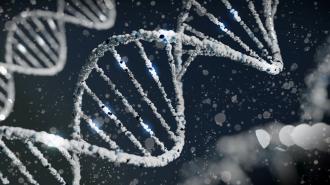During that uncomfortable period between puberty and adulthood, the brain undergoes carefully orchestrated changes in gene expression and epigenetic modification. Alcohol, unfortunately, interferes with this biological architecture. Consequently, mistakes are made, and gene expression and modification do not go as planned, leaving the person vulnerable to a lifetime of psychiatric challenges, such as anxiety and alcoholism.
A team of researchers from the University of Illinois Chicago recently found they could reverse these changes in rats via gene editing. If their findings carry through to human studies, gene editing may be a potential treatment for anxiety and alcohol-use disorder in adults who were exposed to binge drinking in their adolescence.
Genetic victims of alcohol abuse
Synapses are the junctions where nerves meet, and the activity-regulated cytoskeleton-associated (Arc) protein is the key regulator of synaptic plasticity and organization, according to previous research. Arc manipulates connections in the neural network in order to rapidly implement adaptations in the brain. Arc’s nearly instantaneous function is finely tuned by a short segment of DNA known as the synaptic activity response element (SARE). Known as an “enhancer region” on the DNA, SARE controls how much Arc protein is produced: the more protein produced, the faster the neural network adapts. Together, Arc and SARE regulate higher-order cognitive and emotional processes, as well as addiction-relevant behaviors.
In 2019, Subhash Pandey, director of the Center for Alcohol Research in Epigenetics at UIC, and his team found that SARE was different between rats who were exposed to alcohol during adolescence and rats who were not. In both groups of rats, the SARE’s DNA sequence was the same, but its 3-dimensional structure was not. Alcohol-exposed rats had undergone epigenetic modifications, which tangled the Arc-regulatory region like a knot of hair around a glob of gum. This type of epigenetic modification often prevents proteins from being expressed, which led Pandey and his team to suspect that an alcohol-exposed adolescent brain would have less Arc protein as an adult. Their suspicion was correct. They discovered that rats exposed to alcohol had less Arc protein in their amygdala, a crucial brain region implicated in both alcohol-use and anxiety disorders.
Pandey’s team hypothesized that epigenetic modifications caused the decrease in Arc protein, and thus made the brain vulnerable to psychiatric disorders. If they were correct, editing these genes and reversing the modification would reduce alcohol-use disorder and anxiety symptoms in individuals exposed to binge-drinking during their youth.
Gene editing SARE rescues anxiety and drinking symptoms
To determine whether restoring Arc expression would remedy excessive drinking and anxiety symptoms in adulthood, the researchers injected rats with alcohol during adolescence (corresponding to about age 10 to 18 in human years). When the rats reached adulthood, the researchers confirmed that Arc expression had fallen, as compared to rats who were not exposed to alcohol. Then, using CRISPR gene editing, the team reversed SARE’s epigenetic modifications and assessed Arc levels in rats exposed to alcohol. They found Arc expression had returned to normal after gene editing.
Next, the researchers sought to determine if the animals’ behavior had also returned to normal. To assess anxiety, the researchers evaluated the exploratory activity of rats placed in a maze. (More anxious animals tend to explore less.) To assess preference for alcohol, the researchers monitored the amount of alcohol consumed when presented with a choice between tap water, sugar water, and alcohol. The researchers found that all indicators of anxiety and alcohol consumption were significantly lower.
“Early binge drinking can have long-lasting and significant effects on the brain and the results of this study offer evidence that gene editing is a potential antidote to these effects, offering a kind of factory reset for the brain, if you will,” said Pandey. “Adolescent binge drinking is a serious public health issue, and this study not only helps us better understand what happens in developing brains when they are exposed to high concentrations of alcohol but, more importantly, gives us hope that one day we will have effective treatments for the complex and multifaceted diseases of anxiety and alcohol use disorder.”
This article was reprinted with permission of Big Think, where it was originally published.
